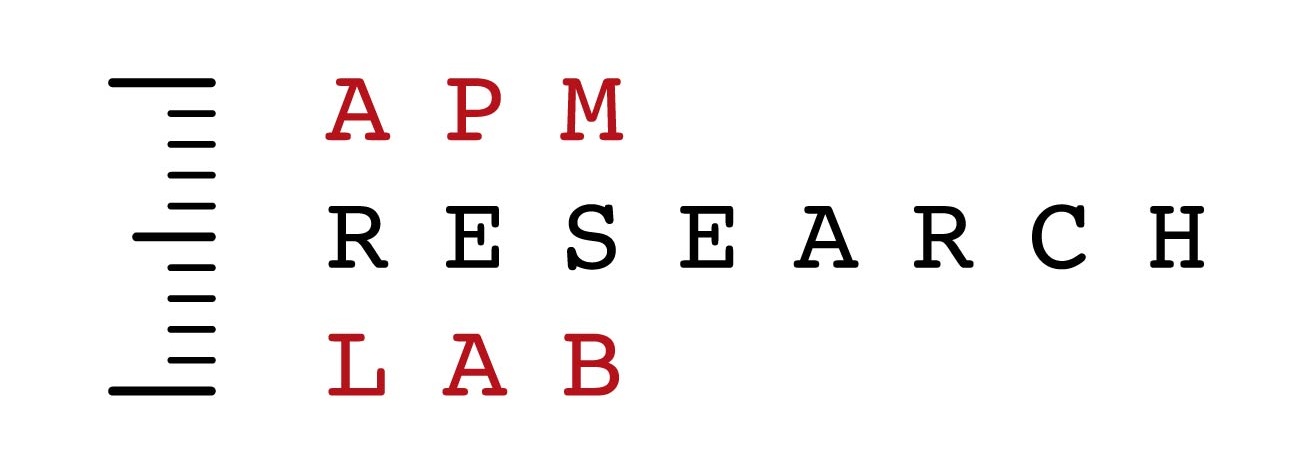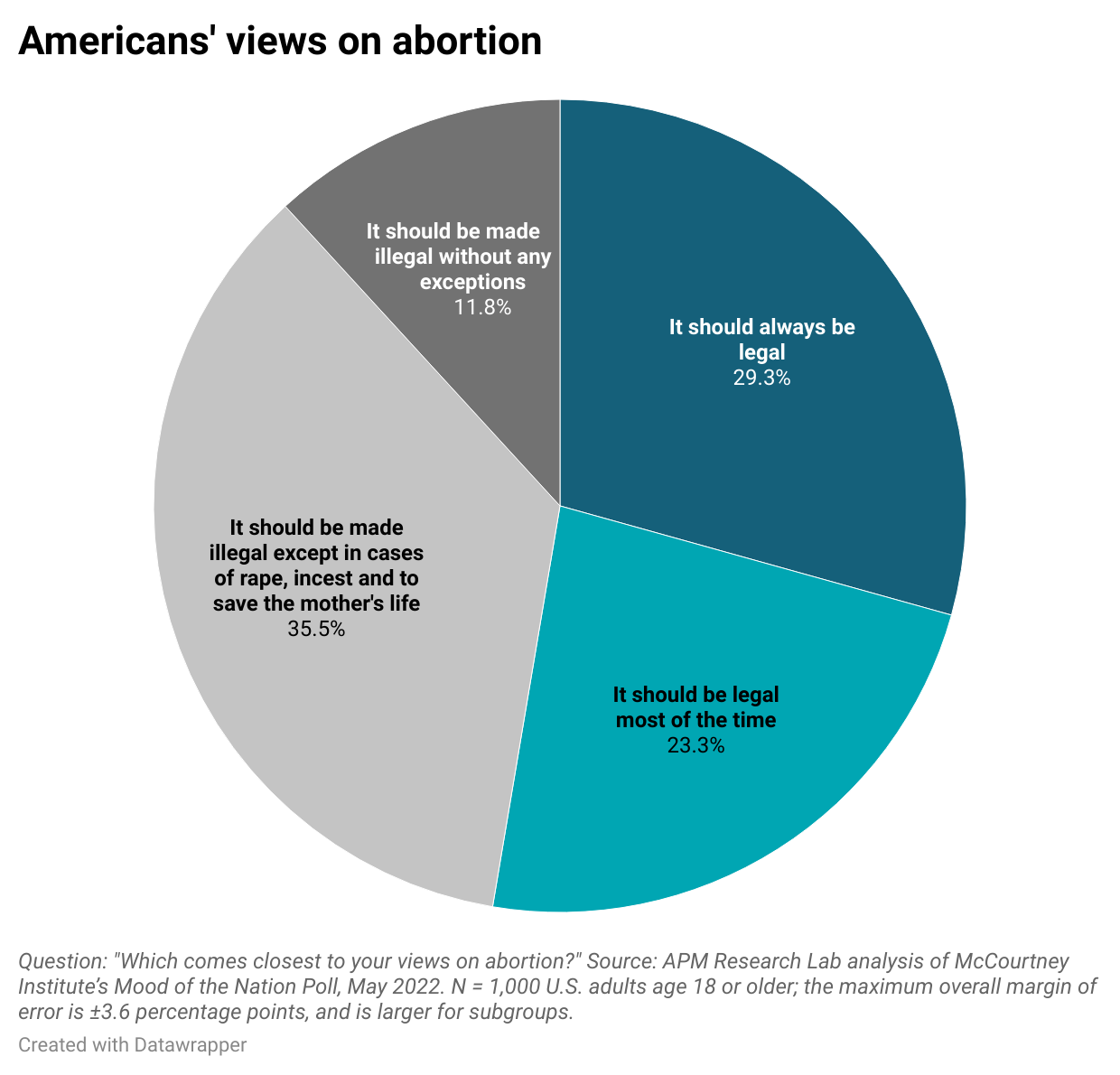On the brink of a potential overturn of Roe v. Wade, Americans are divided on abortion
by CRAIG HELMSTETTER and ERIC PLUTZER
The U.S. Supreme Court is likely to overturn its landmark Roe v. Wade decision according to a leaked draft opinion first obtained by Politico. At this historic moment it is worth taking a look at Americans’ opinions on abortion, and how those opinions follow demographic, socio-economic and political lines.
According to our analysis of data provided by YouGov as a part of the McCourtney Institute for Democracy’s most recent Mood of the Nation Poll, Americans are nearly evenly divided on the legality of abortion:
53% indicate that abortion should be legal, including the 23% who indicate that it should be legal “most of the time.”
36% indicate that abortion should be illegal “except in cases of rape, incest and to save the mother’s life.”
12% indicate that abortion should be illegal in all circumstances.
Roughly three in ten Americans favor unfettered freedom to choose abortion (29%), while almost one in four prefer abortion to be “legal most of the time” (23%), which corresponds to the laws in almost every state while Roe v. Wade remains in force.
Should the Supreme Court completely overturn Roe, many states with trigger laws will suddenly permit abortion only to save the life of the mother and in other extreme circumstances such as when pregnancy is a consequence of rape or incest. A much smaller number of Americans (12%) would ban abortion even in cases where the mother’s health is in danger, which is more restrictive than most laws likely to be enacted.
Opinions related to abortion vary according to demographic characteristics, social and economic characteristics, and, most notably, political affiliations.(1)
Demographics: Women, Millennials and Black Americans favor unrestricted access to abortion at higher rates
While a virtually identical proportion of women and men indicate that abortion should be illegal without any exceptions (12% and 11%), women favor unrestricted access to abortion by 8 percentage points over men (33% versus 25%).
Millennials (age 26-41) favor unrestricted access to abortion at a higher rate than any other generation, including the younger Generation Z (age 10-25, with only those 18 -25 included in this survey of adults).
Three of the four racial and ethnic groups available for analysis favor abortion legality at similar rates. Half of all Whites and just over half of all Latinos and other racial and ethnic groups favor abortion to be legal either all of the time or most of the time. In comparison, a higher proportion of Black Americans, two-thirds, favor legal abortion.
Socio-economics: Born-again Protestants, Catholics oppose abortion legality; to a lesser extent so do those with less education and income
Some religious affiliations have a strong relationship to opinions on abortion.(2) Most notably, only 16% of born-again Protestants favor legalized abortion, while over one-quarter favor abortion to be completely illegal.
Less than half of Catholics favor abortion to be legal, but only 11% indicate support for the statement closest to the Catholic Church’s official position, that abortion should be illegal in all cases. Among the four possible options a strong plurality of Catholics, 45%, indicate that abortion should be illegal except in the case of rape, incest and to save a mother’s life—and 22% indicate that abortion should be legal in all cases.
On the other end of the abortion-by-religion continuum, 42% of both Black Protestants and the group made up of self-identified atheists, agnostics and religiously un-affiliated Americans favor abortion to be legal in all cases.
On their own, education and income are not as decisive as religious affiliation when it comes to opinions on abortion. Sixty-three percent of those with a bachelor’s degree or more education favor at least mostly legal abortions, compared to only 44% of those with a high school diploma or less education.
Similarly, 63% of those with annual family incomes of $100,000 or more favor legal abortion, compared to less than half of those with annual family incomes below $60,000.
Political affiliation: A majority of Democrats and those strongly approving of President Biden’s job approval favor abortion to be legal in all cases
Survey results show that opinions related to abortion are even more closely tied to political affiliation, by and large, than they are to other demographic or socio-economic characteristics—including religious affiliation.
Three-quarters of those who identify as Republican, including independents who lean Republican, indicate that abortion should be illegal. This is also the case among the even bigger group of Americans who indicate that they strongly disapprove of Joe Biden’s performance as president of the United States.
Interestingly, even though Americans’ opinions on abortion are markedly divided along political lines, abortion did not emerge as a major theme in this survey’s open-ended questions seeking to understand why people either approved or disapproved of the President’s job performance—despite that the Supreme Court’s draft opinion was leaked just one week prior to the fielding of this survey. Other issues, including Biden’s character, inflation and the economy, and the war in Ukraine are top-of-mind for more Americans.
However, prochoice Americans will likely look to President Biden and other elected official to provide leadership if they suddenly lose rights than had been secure for over fifty years. Even if the economy remains a major concern, abortion could become a more prominent issue in the 2022 midterm elections.
— — — —
(1) Except where noted, see this survey's methodological report for the numbers respondents in each of the demographic, socio-economic, and political groupings in this analysis.
(2) According to this survey over on-third of Americans identify as either atheist or not having a religious affiliation. The next largest religious group is Catholic (19%), followed by born-again Protestant (17%), other Protestant (11%) and, Black Protestant (6%). Eleven percent are grouped into “all others,” including those who identify as Jewish, Muslim, Buddhist, Hindu, or something else.

